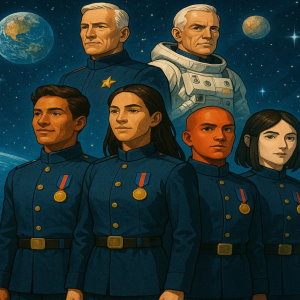
|
Star Cadets |
A group of humans born on different earth colonies are selected to attend "The Space Academy" where they are trained to be Officers in Earth's Space Fleet. Despite the different environments they were born and raised in, they discover they are all human. They successfully finish their training and bravely complete a dangerous space rescue mission. |
By nature, humans are explorers and for a hundred years, Earth had been establishing colonies on different astronomical bodies in the solar system. The first was on Earth's Moon, the second on the planet Mars, and the third on Europa, one of the moons orbiting the planet Jupiter. Each of these were very different and each presented major problems to human survival and to the creation of habitats capable of sustaining human life. These bodies were alike in some ways, but different in others. The Moon and Mars has rocky, crater ridden, dust covered surfaces while Europa is covered in a smooth layer of ice. All three have a gravity significantly lower than Earth's, making a human weigh much less than on Earth. The Moon has almost no atmosphere, Mars one of carbon dioxide, not breathable by humans. While Europa does have a thin oxygen atmosphere, it is not easily adaptable to humans. Europa has an extremely cold environment, while both the Moon and Mars have temperatures from extremely hot to extremely cold. All three have radiation levels much higher than Earth, with Europa experiencing radiation 1800 times higher than Earth. Finally, distance is a problem.
The Moon is the closest to Earth, taking only 3 days travel time. Mars takes 7 - 10 months, a long journey. Europa requires a very difficult 5.5-year journey. To sustain human life on these astronomical bodies requires pressurized habitats, spacesuits, protections from extreme temperatures and radiation, as well as systems for generating air, water, food, and power. Eventually, humans managed to overcome these obstacles by building earth like artificial habitats. But because of how difficult living in these colonies continued to be, Space Command, the organization that oversaw these colonies had prohibited the colonists from having babies. They felt that both the harsh conditions and the unknown effects these dangers may have on human babies made the risk to a new space baby too great. However recently, living conditions on these colonies had improved to the point where having and raising a human baby was feasible. Space Command decided that if humans were to live and thrive on these colonies, they would have to sustain their own populations. So, they directed that a limited number of new babies be conceived, born, and raised on each of the colonies. They would be closely monitored and compared to babies born on Earth.
As an experiment, Space Command registered the birth of four new babies. Leo, an Earth born male baby; Avaan, a Moon born female baby; Zeke, a male born Martian baby; and Juna, an Europian born female baby. The year was 2175 and Space Command decided that, assuming these four babies showed real promise as they grew, they all would be admitted to the Star Academy as first year cadets in the year 2195, when they were 20-year-old young adults.......